Real-time Functional Imaging and Neurofeedback
Feb. 12-13, 2015
Gainesville, FL
Ranganatha Sitaram, University of Florida
 Dr. Sitaram’s research focus is in the fields of Neuroimaging and Brain-Machine Interfaces, which lie at the intersection of neuroscience, imaging and computational intelligence. His work is based on the pivotal question: can modulation of brain activity in selected regions and networks lead to specific changes in sensation, perception, cognition and action, and if so what are they and how can they be used in the clinical treatment of neurological and psychiatric disorders? Prior to his current position as an Assistant Professor at the University of Florida, Dr. Sitaram was a faculty member at the Institute of Medical Psychology and Behavioral Neurobiology (2009-2012) in the University of Tubingen. During 2000-2004, Dr. Sitaram served as Lead Scientist and Chief Technology Officer at the Institute of InfoComm Research in Singapore in a variety of computational and engineering fields, including artificial intelligence and robotics, communications and control, and software engineering.
Dr. Sitaram’s research focus is in the fields of Neuroimaging and Brain-Machine Interfaces, which lie at the intersection of neuroscience, imaging and computational intelligence. His work is based on the pivotal question: can modulation of brain activity in selected regions and networks lead to specific changes in sensation, perception, cognition and action, and if so what are they and how can they be used in the clinical treatment of neurological and psychiatric disorders? Prior to his current position as an Assistant Professor at the University of Florida, Dr. Sitaram was a faculty member at the Institute of Medical Psychology and Behavioral Neurobiology (2009-2012) in the University of Tubingen. During 2000-2004, Dr. Sitaram served as Lead Scientist and Chief Technology Officer at the Institute of InfoComm Research in Singapore in a variety of computational and engineering fields, including artificial intelligence and robotics, communications and control, and software engineering.
Sven Haller, University of Geneva
 In parallel to MD from Medical school at the University of Tübingen, Germany, Dr. Haller completed the Master of Sciences at the Max Planck research school of Neural and Behavioral Tübingen, Germany. He specialized in Radiology and diagnostic Neuroradiology at the University Hospital of Basel, Switzerland. Thereafter, Dr. Haller completed his Privatdozent (venia docendi, senior lecturer) in Neuroradiology at the University Hospital Geneva, Switzerland. Currently, he is a senior staff Neuroradiologist at the University Hospital Geneva, Switzerland, with a special interest in advanced neuroimaging techniques, in particular in the domains of neurodegenerative and neurovascular diseases including clinical studies.
In parallel to MD from Medical school at the University of Tübingen, Germany, Dr. Haller completed the Master of Sciences at the Max Planck research school of Neural and Behavioral Tübingen, Germany. He specialized in Radiology and diagnostic Neuroradiology at the University Hospital of Basel, Switzerland. Thereafter, Dr. Haller completed his Privatdozent (venia docendi, senior lecturer) in Neuroradiology at the University Hospital Geneva, Switzerland. Currently, he is a senior staff Neuroradiologist at the University Hospital Geneva, Switzerland, with a special interest in advanced neuroimaging techniques, in particular in the domains of neurodegenerative and neurovascular diseases including clinical studies.
Jarrod Lewis-Peacock, University of Texas at Austin
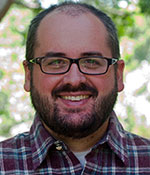 Jarrod’s work focuses on understanding how the processes of working memory and long-term memory interact with one another, and on how people dynamically deploy these resources in the service of pursuing their goals. His research also explores how memory interacts with other high-level cognitive functions and abilities such as perception, attention, learning, and decision making. To address these topics, he uses a combination of behavioral methods, functional neuroimaging, and computational approaches. For example, he uses machine learning techniques to analyze distributed spatial patterns of fMRI brain data to reveal, on a moment-to-moment basis, what a person is seeing, holding in mind, remembering, and even forgetting. His lab is currently adapting these techniques for use with high-speed, high-resolution real-time neuroimaging at the Imaging Research Center at UT Austin. The goal is to create a powerful closed-loop system with which to directly test models of memory and cognition, and to explore the extent to which memory abilities (e.g., prospective remembering and selective forgetting) can be trained using neurofeedback.
Jarrod’s work focuses on understanding how the processes of working memory and long-term memory interact with one another, and on how people dynamically deploy these resources in the service of pursuing their goals. His research also explores how memory interacts with other high-level cognitive functions and abilities such as perception, attention, learning, and decision making. To address these topics, he uses a combination of behavioral methods, functional neuroimaging, and computational approaches. For example, he uses machine learning techniques to analyze distributed spatial patterns of fMRI brain data to reveal, on a moment-to-moment basis, what a person is seeing, holding in mind, remembering, and even forgetting. His lab is currently adapting these techniques for use with high-speed, high-resolution real-time neuroimaging at the Imaging Research Center at UT Austin. The goal is to create a powerful closed-loop system with which to directly test models of memory and cognition, and to explore the extent to which memory abilities (e.g., prospective remembering and selective forgetting) can be trained using neurofeedback.
Luke Stoeckel, Harvard University / MGH and Harvard Medical School
 Luke Stoeckel is a licensed clinical neuropsychologist who specializes in patient-oriented neuroscience research. He is the Director of the Cognitive & Clinical Neuroscience of Obesity & Diabetes Program at the National Institute of Digestive & Diabetes & Kidney Diseases at the National Institutes of Health. He is also Assistant Professor in Psychology in the Department of Psychiatry at Massachusetts General Hospital and Lecturer on Psychology in the Department of Psychiatry at Harvard Medical School. Dr. Stoeckel's research interests include the investigation of brain-behavior relationships and pathophysiology of disorders such as obesity and diabetes, and their intersection with other neurological and psychiatric diseases, including eating disorders, addiction, schizophrenia, and dementia.
Luke Stoeckel is a licensed clinical neuropsychologist who specializes in patient-oriented neuroscience research. He is the Director of the Cognitive & Clinical Neuroscience of Obesity & Diabetes Program at the National Institute of Digestive & Diabetes & Kidney Diseases at the National Institutes of Health. He is also Assistant Professor in Psychology in the Department of Psychiatry at Massachusetts General Hospital and Lecturer on Psychology in the Department of Psychiatry at Harvard Medical School. Dr. Stoeckel's research interests include the investigation of brain-behavior relationships and pathophysiology of disorders such as obesity and diabetes, and their intersection with other neurological and psychiatric diseases, including eating disorders, addiction, schizophrenia, and dementia.
Frank Scharnowski, University of Geneva
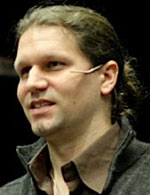 Frank Scharnowski is a cognitive neuroscientist jointly affiliated with the University Hospital Geneva and the Swiss Institute of Technology Lausanne. His work focuses on understanding human brain processing in health and disease. To study the brain, Frank uses real-time fMRI neurofeedback to manipulate brain activity and to subsequently determine how such manipulations affect perception and behavior. Using this method, Frank has for example shown that brain training of visual cortex improves visual sensitivity, that voluntary control over the motor cortex speeds up motor reaction times, and that control over emotion networks improve valence ratings. Frank also develops novel neurofeedback methods, such as connectivity-based neurofeedback, which allows healthy individuals and patients to learn voluntary control over distributed brain networks.
Frank Scharnowski is a cognitive neuroscientist jointly affiliated with the University Hospital Geneva and the Swiss Institute of Technology Lausanne. His work focuses on understanding human brain processing in health and disease. To study the brain, Frank uses real-time fMRI neurofeedback to manipulate brain activity and to subsequently determine how such manipulations affect perception and behavior. Using this method, Frank has for example shown that brain training of visual cortex improves visual sensitivity, that voluntary control over the motor cortex speeds up motor reaction times, and that control over emotion networks improve valence ratings. Frank also develops novel neurofeedback methods, such as connectivity-based neurofeedback, which allows healthy individuals and patients to learn voluntary control over distributed brain networks.
Frank’s work is generously funded by the Swiss National Science Foundation, the Wellcome Trust, and the European Union.
James Sulzer, University of Texas at Austin
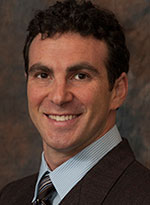 James Sulzer has been an assistant professor in Mechanical Engineering at the University of Texas at Austin since 2013. Dr. Sulzer started research on rtfMRI neurofeedback in 2009 as a postdoc for Roger Gassert at ETH Zurich. His focus is on developing the technology towards sensorimotor rehabilitation following stroke. Dr. Sulzer obtained his Masters from Northwestern University and the Rehabilitation Institute of Chicago in 2006 and his Ph.D. in Mechanical Engineering from the same institutions in 2009, investigating wearable robotics (exoskeletons) for stroke patients. He received his B.S. in 2002 from the Ohio State University, also in Mechanical Engineering.
James Sulzer has been an assistant professor in Mechanical Engineering at the University of Texas at Austin since 2013. Dr. Sulzer started research on rtfMRI neurofeedback in 2009 as a postdoc for Roger Gassert at ETH Zurich. His focus is on developing the technology towards sensorimotor rehabilitation following stroke. Dr. Sulzer obtained his Masters from Northwestern University and the Rehabilitation Institute of Chicago in 2006 and his Ph.D. in Mechanical Engineering from the same institutions in 2009, investigating wearable robotics (exoskeletons) for stroke patients. He received his B.S. in 2002 from the Ohio State University, also in Mechanical Engineering.
Nikolaus Weiskopf, University College London
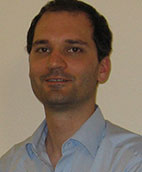 Nikolaus Weiskopf is physicist and neuroscientist developing novel magnetic resonance imaging (MRI) methods for understanding of the human brain. He is Head of Physics at the Wellcome Trust Centre for Neuroimaging at the University College London, UK. He serves as Associate Editor for Frontiers in Brain Imaging Methods. Nikolaus Weiskopf is a principal investigator in the EU consortium BrainTrain that improves and adapts real-time fMRI neurofeedback for clinical use. Nikolaus Weiskopf is a pioneer of real-time functional MRI used for neurofeedback. He introduced concepts such as continuous online feedback, differential self-regulation and new acquisition methods such as real-time distortion correction. He and his team develop and apply novel MRI pulse sequences, image reconstruction methods and post-processing methods that will further extend the current neurofeedback approach. Further research interests include ultra-high resolution imaging and in-vivo histology using non-invasive MRI.
Nikolaus Weiskopf is physicist and neuroscientist developing novel magnetic resonance imaging (MRI) methods for understanding of the human brain. He is Head of Physics at the Wellcome Trust Centre for Neuroimaging at the University College London, UK. He serves as Associate Editor for Frontiers in Brain Imaging Methods. Nikolaus Weiskopf is a principal investigator in the EU consortium BrainTrain that improves and adapts real-time fMRI neurofeedback for clinical use. Nikolaus Weiskopf is a pioneer of real-time functional MRI used for neurofeedback. He introduced concepts such as continuous online feedback, differential self-regulation and new acquisition methods such as real-time distortion correction. He and his team develop and apply novel MRI pulse sequences, image reconstruction methods and post-processing methods that will further extend the current neurofeedback approach. Further research interests include ultra-high resolution imaging and in-vivo histology using non-invasive MRI.
Maria Laura Blefari, Swiss Federal Institute of Technology at Laussane
(Scientific Program Committee)
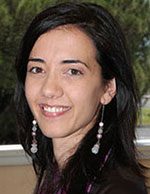 Maria-Laura Blefari is a Postdoc at the Center for Neuroprosthetics at the Swiss Federal Institute of Technology Lausanne (EPFL),Switzerland. Her research interest is exploiting the complementarity of EEG and rtfMRI neurofeedback to pursue the ambitious goal of understanding why a significant percentage of the population is not able to attain proficient control of a Brain Machine Interface (BMI). This understanding could be leveraged to allow designers to improve the interaction between the two systems - the user's brain and the BMI.
Maria-Laura Blefari is a Postdoc at the Center for Neuroprosthetics at the Swiss Federal Institute of Technology Lausanne (EPFL),Switzerland. Her research interest is exploiting the complementarity of EEG and rtfMRI neurofeedback to pursue the ambitious goal of understanding why a significant percentage of the population is not able to attain proficient control of a Brain Machine Interface (BMI). This understanding could be leveraged to allow designers to improve the interaction between the two systems - the user's brain and the BMI.
She received her PhD in Biorobotics from Scuola Superiore Sant'Anna, Pisa, Italy in December 2011. In June 2010 she joined the Rehabilitation Engineering Lab at the ETH, Zurich, Switzerland where she has been investigating the potential use of rfMRI as a scientific tool to understand how changes in neural correlates are linked to changes in motor performance.
